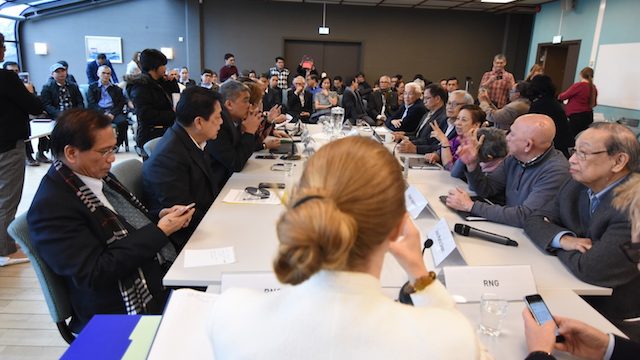SUMMARY
This is AI generated summarization, which may have errors. For context, always refer to the full article.

Ms. Carol Araullo, member of the National Democratic Front of the Philippines (NDFP) that is negotiating a peace deal with the Government of the Republic of the Philippines (GRP), is well within her right to present her own analysis on and interpretation of what occurred during the intense meetings at the second round of peace talks between both sides in Oslo, Norway. (READ: Thorny issues emerge in Oslo peace talks)
But I find it improper for her to hurl some serious issues and criticisms against the government panel and, in the same breadth, heap all praises on the NDFP.
Of course the two panels will have diametrically opposed positions. After all, that’s the reason these negotiations are taking place in the first place: because one group (NDFP) is challenging the authority of the other (GRP) by launching an armed struggle.
But as all wars eventually end in negotiations, the Duterte government has chosen to reach out, listen and hold talks with the NDFP and find a way to end the armed conflict in the country.
Ms. Araullo, as a member of the NDFP delegation, should be more circumspect as she is no longer an outsider looking in but an active participant in the peace process. As a member of the NDFP delegation, she is duty-bound to abide by the signed joint statements and agreements.
Any contrary opinion by any member of the delegation from both sides, especially casting doubts on the sincerity of the other side of the negotiating panel, will only encourage and generate irritants and provide spoilers the tool to jeopardize the negotiations.
For sure there will be some contentious and disagreeable points during the course of peace negotiations. But shouldn’t these these points be raised by the members of the negotiating panels themselves?
Here are my thoughts (in itals) on the points she raised in her BusinessWorld column.
Dr. Carol Araullo: The Reciprocal Working Committees (RWCs) on Social and Economic Reforms (SER) had a much more difficult time getting their act together despite working overtime and holding many one-sided caucuses in between.
Who was it who said that launching a revolution is no picnic? Just because the two parties are holding peace negotiations doesn’t mean the road to peace is already easy. What did she mean by one-sided caucuses, anyway?
Araullo: Negotiations on SER are facing serious if not overwhelming odds beginning with a whale of a difference in the two parties’ appreciation of what is wrong with the system and ergo what reforms are needed to address the roots of the armed conflict.
From the very start, the government panel has maintained that the road to peace is full of bumps. Both panels agree that the heart and soul – the meat – of the negotiations are the social and economic reform agenda. And between a status quo and an overhaul, that’s indeed a whale of a difference. Did anybody expect otherwise?
Araullo: For the GRP, it is a matter of making the system work better, to be more “inclusive,” be less bureaucratic or more responsive to the poor and underprivileged sections of society, and, perhaps, more accommodating to the demands of the NDFP forces that have been fighting for major reforms.
This is a rather sweeping statement. While the government indeed is striving to be more inclusive, it is prepared to go beyond the issue of governance and delivery of services. “Accommodating to the demands of the DFP forces” is rather too gracious. The fact that it is the government (under Duterte) that pushed for the resumption of the peace talks is quite a great leap from previous governments.
Not only that, President Duterte has taken several bold steps to prove his determination and commitment to end the war.
The sheer number of NDFP delegation (rounding up to 60) in the Oslo 2nd round, more than a handful of them released on bail upon the insistence of the government, is more than just a gesture of goodwill and manifestation of sincerity. (READ: Who’s who: Political prisoners released for Oslo talks)
That the negotiations have come this far is a testament to the political will of the Duterte government.

Araullo: On top of contrasting if not diametrically opposed points of view, was the seeming lackadaisical preparation of the GRP RWC-SER. They did not even have an honest-to-goodness draft outline comparable to the fleshed-out one submitted by the NDFP.
Again, one is tempted to conclude that Ms. Araullo was expecting the government to outline a reform agenda that will suit the expectations of the NDFP.
As government representatives extending their hands of peace, members of the GRP panel are there to receive the proposed reform agenda from the group that is challenging its authority.
It is not duty-bound to present its own although the agreement during the first round of talks in August is that both parties are going to agree on the outline and framework of discussions on social and economic reforms.
As shown in the minutes and results of the August rounds of Oslo talks, it was the NDFP which was submitting the proposed language and tenor of the joint statement with the government panel reviewing, revising and agreeing to the final cut.
As for the government, it would, as much as possible, maintain the status quo and work within the framework of the existing bureaucracy. But it recognizes that there are many failures in governance that are not solely attributable to implementation but also rooted in the bureaucracy itself. Hence, the need for reforms.
And President Duterte has clearly stated his desire to institute reforms. Inviting the NDF to the negotiating table is one way of accommodating and jumpstarting such reforms.
Araullo: The GRP panel seemed to expect the NDFP to agree to the premise that socioeconomic reforms should dovetail the way the GRP is organized. The current panel apparently has not discarded the framework of its predecessors in keeping reforms strictly within the bounds of the GRP Constitution and legal processes.
She could not be more entirely wrong on this.
The reason why the GRP panel is soliciting the cooperation of the bureaucracy is because it is the only entity that has experience in governance. Governments are so organized that way – whether under their current form or any other forms in the future. There will always be a bureaucracy.
To again accuse the panel of not having departed from negotiating within the framework of the Constitution is to belittle the capacity of the GRP panel to appreciate its role as negotiators capable of thinking out of the box in the same manner that the President has approached the peace process in the most unconventional way.
The GRP panel is there to protect the President. That is why there are legal processes that must be observed. For after all, the success or failure of the negotiations hinges on the political will of the President.
Araullo: In contrast, the NDFP presented a radically different analysis of what ails Philippine society and consequently what are the major socioeconomic reforms needed to solve these ills. The NDFP-proposed outline reflected this in terms of highlighting the long-standing problem of land monopoly by a few, necessitating a genuine land reform program anchored on the principle of land to the tiller.
Coming from a member of the NDFP delegation, this is obviously self-serving.
Araullo: Based on the GRP’s conduct at the second round of formal talks, it has become increasingly obvious that it remains fixated on “reducing the levels of violence” by clinching a bilateral cease-fire and giving this primacy over the negotiations on basic social, economic and political reforms.
Who does not want to end the violence in the countryside, anyway?
Again, Ms Araullo misses the point here. To say that the government is giving primacy to the bilateral ceasefire over a reform agenda is another sweeping statement. This shows her contempt of the processes of the peace negotiations. Unless she has been designated as the official spokesperson of the NDFP panel?
Araullo: Thornier still is the matter of the GRP’s release of more than 400 political prisoners including three remaining JASIG-protected NDFP consultants who are serving time in the National Penitentiary after having been convicted on trumped-up common crimes. (READ: PH starts process of freeing political prisoners)
First, it was the NDFP that tied up the bilateral ceasefire to the release of detained NDF consultants and members despite the fact that these two issues were separate and distinct based on language of the August 2016 joint statement.
Second, the August rounds clearly stated that the agenda in the peace talks are to be discussed and negotiated simultaneously although not independent of each other.
But the GRP panel has not reneged and is not reneging on its commitment to work and recommend for the early release of detained rebel leaders and members.
As borne out again by the discussions and minutes of the October 2nd round of talks, what have been committed in August were already delivered – a draft amnesty proclamation for detained rebels as submitted in a list provided by the NDF on September 15 and an option for the NDFP lawyers to pursue their early release which, according to the discussions, the NDF lawyers failed to act on in a timely manner thus the delay in speeding up the release process.
These are but few of my own observations of what transpired during the two rounds of talks and as a reaction to what Dr. Araullo wrote in her column. That is why I believe there was wisdom in not opening up the plenary session to the press and not allowing any official audio recording of the discussions. Because any agreements or non-agreements will be subject to the concurrence and consensus of the negotiating panels.
For that, I will not go beyond what has been said. – Rappler.com
The author is a member of the delegation of the government panel and was present in the 1st and 2nd rounds of peace negotiations both held in Oslo, Norway, in August and October 2016.
Add a comment
How does this make you feel?
There are no comments yet. Add your comment to start the conversation.